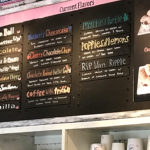Since switching careers five years ago from banking to cooking (which has begun to look like the luckiest accidental bullet-dodging ever), I’ve learned a new language: KitchenSpeak.
Recently I wrote about how controlled but chaotic a busy, successful commercial kitchen is. KitchenSpeak helps simplify our duties and interactions. It’s a weird, hopefully efficient, sometimes crude amalgam of verbal shorthand, hallelujah choruses, superstitions and private jokes. Every restaurant has its own particular patois and dialect – while sharing other KitchenSpeak terms and definitions with other restaurants everywhere.
Example: Brevity is the soul of getting food to tables fast, so words lose a syllable or two. “Regular” becomes reggae. “Linguini with meatballs” becomes ling-ball. “Mushrooms” condenses to mush. Thus, the plain English sentence, “On the left is the regular linguini-with-meatballs pasta dish and on the right is the linguini-with-meatballs pasta dish with mushrooms added by special request” is shortened in KitchenSpeak to “Left, reggae ling-ball, right, speck ling-ball add mush.” That’s a 36 percent savings.
In a loud, boisterous atmosphere, it’s also important to acknowledge the exchange of information. Otherwise, the person giving direction might never know if the person receiving even heard it. So, if the sous chef pulls a ticket and calls out “Walkin’ in (i.e., “this is a new order”) pantry: two small Caesars with chicken. One D.O.S.!” the first thing the pantry station worker does is holler “Heard, Chef!” or “Check, baby! – Two chicken Caesars, one doss it don’t toss it!” Translation: I hear you and obey. Two Caesar salads, add chicken to both; one with dressing on the side. (D.O.S. = Dressing On the Side.)
Guests’ steak-doneness preferences are crucial. It’s easy to differentiate the expo’s (expediter) calling for a “rare,” “medium” or “well-done” steak. But suppose he yells “medium-well” and the “-well” part gets lost in the crash of a busser dropping his tub? So “medium-rare” becomes mid-rare, and “medium-well” becomes mid-well. Consequently, if you hear “mid,” you know you need to expect another modifying syllable.
Some superstitions and customs are particular to each kitchen alone. Where I work, we have only one door between the kitchen and dining room. That demands a strict rule about which way the door swings: It swings out into the dining room for those laden with full plates of hot food bound for tables. It swings out again, toward the kitchen, when one’s inbound and laden with dirty dishes. This critical rule helps avoid repeated collisions. Even so, if you’re so heavily laden that it’s unavoidable – and you’ve peeped through the door’s glass porthole to ensure no one’s within a few inches of the other side – it’s acceptable to push the door open from the dining room into the kitchen … if and only if you holler “Wrong way!” as a warning when you come through. This has become so ingrained that I even yell “Wrong way!” if it’s 5 a.m. and I’ve just unlocked the door and I know I’m the only person in the building.
Some things are simply inexplicable. So if you’re in our dining room and you hear a loud, unanimous “Yeeeeee-HAW!” from behind the kitchen door, you’ll know somebody’s ordered a “Wild Bill’s Cajun Cheese” appetizer platter.
The writer, a graduate of Sullivan University, has worked at many Louisville independent restaurants, including Limestone, Jack Fry’s, Jarfi’s and L&N Wine Bar and Bistro. She is now the pastry chef at Café Lou Lou.



